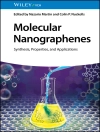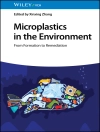Polymer composites are materials in which the matrix polymer is reinforced with organic/inorganic fillers of a definite size and shape, leading to enhanced performance of the resultant composite. These materials find a wide number of applications in such diverse fields as geotextiles, building, electronics, medical, packaging, and automobiles.
This first systematic reference on the topic emphasizes the characteristics and dimension of this reinforcement.
The authors are leading researchers in the field from academia, government, industry, as well as private research institutions across the globe, and adopt a practical approach here, covering such aspects as the preparation, characterization, properties and theory of polymer composites.
The book begins by discussing the state of the art, new challenges, and opportunities of various polymer composite systems. Interfacial characterization of the composites is discussed in detail, as is the macro- and micromechanics of the composites. Structure-property relationships in various composite systems are explained with the help of theoretical models, while processing techniques for various macro- to nanocomposite systems and the influence of processing parameters on the properties of the composite are reviewed in detail. The characterization of microstructure, elastic, viscoelastic, static and dynamic mechanical, thermal, tribological, rheological, optical, electrical and barrier properties are highlighted, as well as their myriad applications.
Divided into three volumes: Vol. 1. Macro- and Microcomposites; Vol. 2. Nanocomposites; and Vol. 3. Biocomposites.
Содержание
The Editors XIII
List of Contributors XV
1 State of the Art – Nanomechanics 1
Amrita Saritha, Sant Kumar Malhotra, Sabu Thomas, Kuruvilla Joseph, Koichi Goda, and Meyyarappallil Sadasivan Sreekala
1.1 Introduction 1
1.2 Nanoplatelet-Reinforced Composites 3
1.3 Exfoliation–Adsorption 4
1.4 In Situ Intercalative Polymerization Method 5
1.5 Melt Intercalation 6
1.6 Nanofiber-Reinforced Composites 7
1.7 Characterization of Polymer Nanocomposites 7
1.8 Recent Advances in Polymer Nanocomposites 8
1.9 Future Outlook 9
References 9
2 Synthesis, Surface Modification, and Characterization of Nanoparticles 13
Liaosha Wang, Jianhua Li, Ruoyu Hong, and Hongzhong Li
2.1 Introduction 13
2.2 Synthesis and Modification of Nanoparticles 13
2.2.1 Synthesis of Nanoparticles 13
2.2.2 Synthesis of Titania Nanoparticles 14
2.2.3 Microwave Synthesis of Magnetic Fe3O4 Nanoparticles 15
2.2.4 Magnetic Field Synthesis of Fe3O4 Nanoparticles 15
2.2.5 Synthesis of Fe3O4 Nanoparticles without Inert Gas Protection 16
2.2.6 Synthesis of Zn O Nanoparticles by Two Different Methods 16
2.2.7 Synthesis of Silica Powders by Pressured Carbonation 17
2.2.8 MW-Assisted Synthesis of Bisubstituted Yttrium Garnet Nanoparticles 18
2.2.9 Molten Salt Synthesis of Bisubstituted Yttrium Garnet Nanoparticles 18
2.3 Modification of Nanoparticles 19
2.3.1 Surface Modification of Zn O Nanoparticles 20
2.3.2 Surface Modification of Fe3O4 Nanoparticles 20
2.3.3 Surface Modification of Silica Nanoparticles 23
2.4 Preparation and Characterization of Polymer–Inorganic Nanocomposites 23
2.4.1 Nanopolymer Matrix Composites 23
2.5 Preparation of Polymer–Inorganic Nanocomposites 26
2.5.1 Sol–Gel Processing 26
2.5.2 In Situ Polymerization 27
2.5.3 Particle In Situ Formation 27
2.5.4 Blending 28
2.5.4.1 Solution Blending 28
2.5.4.2 Emulsion or Suspension Blending 30
2.5.4.3 Melt Blending 31
2.5.4.4 Mechanical Grinding/Blending 31
2.5.5 Others 31
2.6 Characterization of Polymer–Inorganic Nanocomposites 32
2.6.1 X-Ray Diffraction 32
2.6.2 Infrared Spectroscopy 33
2.6.3 Mechanical Property Test 34
2.6.4 Abrasion Resistance Test 35
2.6.5 Impact Strength 36
2.6.6 Flexural Test 37
2.6.7 Others 38
2.7 Applications of Polymer–Inorganic Nanocomposites 39
2.7.1 Applications of Bi-YIG Films and Bi-YIG Nanoparticle-Doped PMMA 39
2.7.1.1 Magneto-Optical Isolator 40
2.7.1.2 Magneto-Optical Sensor 41
2.7.1.3 Tuned Filter 42
2.7.1.4 Magneto-Optical Recorder 42
2.7.1.5 Magneto-Optic Modulator 43
2.7.1.6 Magneto-Optic Switch 44
2.8 Application of Magnetic Fe3O4-Based Nanocomposites 44
2.9 Applications of Zn O-Based Nanocomposites 46
2.9.1 Gas Sensing Materials 46
2.9.2 Photocatalyst for Degradation of Organic Dye 46
2.9.3 Benard Convection Resin Lacquer Coating 47
2.10 Applications of Magnetic Fluid 48
References 49
3 Theory and Simulation in Nanocomposites 53
Qinghua Zeng and Aibing Yu
3.1 Introduction 53
3.1.1 Dispersion of Nanoparticles 53
3.1.2 Interface 54
3.1.3 Crystallization 54
3.1.4 Property Prediction 54
3.2 Analytical and Numerical Techniques 55
3.2.1 Analytical Models 55
3.2.2 Numerical Methods 56
3.2.3 Multiscale Modeling 57
3.3 Formation of Nanocomposites 58
3.3.1 Thermodynamics of Nanocomposite Formation 58
3.3.2 Kinetics of Nanocomposite Formation 59
3.3.3 Morphology of Polymer Nanocomposites 60
3.4 Mechanical Properties 62
3.4.1 Stiffness and Strength 62
3.4.2 Stress Transfer 64
3.4.3 Mechanical Reinforcement 64
3.4.4 Interfacial Bonding 65
3.5 Mechanical Failure 65
3.5.1 Buckling 65
3.5.2 Fatigue 66
3.5.3 Fracture 66
3.5.4 Wear 66
3.5.5 Creep 67
3.6 Thermal Properties 67
3.6.1 Thermal Conductivity 67
3.6.2 Thermal Expansion 68
3.7 Barrier Properties 69
3.8 Rheological Properties 70
3.9 Conclusions 71
References 72
4 Characterization of Nanocomposites by Scattering Methods 75
Valerio Causin
4.1 Introduction 75
4.2 X-Ray Diffraction and Scattering 76
4.2.1 Wide-Angle X-Ray Diffraction 76
4.2.2 Wide-Angle X-Ray Diffraction in the Characterization of Polymer-Based Nanocomposites 77
4.2.3 Wide-Angle X-Ray Diffraction in the Characterization of the Structure of the Polymer Matrix 83
4.2.4 Small-Angle X-Ray Scattering 84
4.3 Neutron Scattering 93
4.4 Light Scattering 96
References 99
5 Mechanical–Viscoelastic Characterization in Nanocomposites 117
Vera Realinho, Marcelo Antunes, David Arencon, and Jose I. Velasco
5.1 Introduction 117
5.2 Factors Affecting the Mechanical Behavior of Nanocomposites 118
5.2.1 Influence of the Filler’s Aspect Ratio and Dispersion 118
5.2.2 Influence of the Filler–Matrix Interphase 120
5.3 Micromechanical Models for Nanocomposites 121
5.3.1 Basic Assumptions and Preliminary Concepts 122
5.3.1.1 Continuum Models 122
5.3.1.2 Equivalent Continuum Model and Self-Similar Model 123
5.3.1.3 Finite Element Modeling 123
5.3.2 Micromechanical Nanocomposites Modeling 125
5.4 Mechanical Characterization of Nanocomposites under Static Loading 127
5.4.1 Polymer-Layered Silicate Nanocomposites 127
5.4.2 Polymer–CNT Nanocomposites 129
5.4.3 Particulate Polymer Nanocomposites 130
5.5 Characterization by Dynamic Mechanical Thermal Analysis 131
5.6 Mechanical Characterization by Means of Indentation Techniques 133
5.7 Fracture Toughness Characterization of Nanocomposites 135
5.8 Conclusions 139
References 140
6 Characterization of Nanocomposites by Optical Analysis 147
Lucilene Betega de Paiva and Ana Rita Morales
6.1 Introduction 147
6.2 Influence of Nanoparticles on the Visual Aspect of Nanocomposites 148
6.3 Characterization of Appearance 151
6.3.1 Gloss 152
6.3.2 Haze 153
6.3.3 Color 154
6.4 Characterization by UV–Visible Spectrophotometry 156
6.5 Characterization by Optical Microscopy 158
References 160
7 Characterization of Mechanical and Electrical Properties of Nanocomposites 163
Iren E. Kuznetsova, Boris D. Zaitsev, and Alexander M. Shikhabudinov
7.1 Introduction 163
7.2 The Influence of the Molding Temperature on the Density of the Nanocomposite Samples Based on the Low-Density Polyethylene 164
7.3 Experimental Study of the Temperature Dependence of the Permittivity of the Nanocomposite Materials 168
7.4 Elastic and Viscous Properties of the Nanocomposite Films Based on the Low-Density Polyethylene Matrix 172
7.4.1 Technology of Producing the Nanocomposite Polymeric Films 172
7.4.2 Determination of the Coefficients of Elasticity and Viscosity of Nanocomposite Polymeric Films 173
7.5 Effect of the Nanoparticle Material Density on the Acoustic Parameters of Nanocomposites Based on the Low-Density Polyethylene 179
7.6 Conclusions 182
References 183
8 Barrier Properties of Nanocomposites 185
Amrita Saritha and Kuruvilla Joseph
8.1 Introduction 185
8.2 Nanocomposites from Ceramic Oxides 186
8.3 Nanocomposites from Nanotubes 186
8.4 Layered Silicate Nanocomposites 187
8.5 Composite Models of Permeation 191
8.5.1 Nielsen Model 191
8.5.2 Bharadwaj Model 191
8.5.3 Fredrickson and Bicerano Model 192
8.5.4 Cussler Model 193
8.5.5 Gusev and Lusti Model 193
8.6 Techniques Used to Study the Permeability of Polymers and Nanocomposites 195
8.7 Calculation of Breakthrough Time 196
8.8 Applications 197
8.9 Conclusions 198
References 198
9 Polymer Nanocomposites Characterized by Thermal Analysis Techniques 201
Carola Esposito Corcione, Antonio Greco, Mariaenrica Frigione, and Alfonso Maffezzoli
9.1 Introduction 201
9.2 Thermal Analysis Methods 202
9.2.1 Differential Scanning Calorimetry 202
9.2.2 Thermogravimetric Analysis 209
9.3 Dynamic Mechanical Thermal Analysis 211
9.4 Thermal Mechanical Analysis 214
9.5 Conclusions 215
References 215
10 Carbon Nanotube-Filled Polymer Composites 219
Dimitrios Tasis and Kostas Papagelis
10.1 Introduction 219
10.2 Processing Methods 220
10.2.1 Common Approaches 220
10.3 Novel Approaches 223
10.3.1 CNT-Based Membranes and Networks 223
10.3.2 CNT-Based Fibers 229
10.4 Mechanical Properties of Composite Materials 232
10.5 Basic Theory of Fiber-Reinforced Composite Materials 232
10.6 Stress Transfer Efficiency in Composites 234
10.7 Mechanical Properties: Selected Literature Data 236
10.8 Electrical Properties of Composite Materials 236
10.9 Electrical Properties: Selected Literature Data 240
10.10 CNT–Polymer Composite Applications 243
References 244
11 Applications of Polymer-Based Nanocomposites 249
Thien Phap Nguyen
11.1 Introduction 249
11.2 Preparation of Polymer-Based Nanocomposites 250
11.3 Applications of Nanocomposites 251
11.3.1 Mechanical Properties and Applications 251
11.3.2 Thermal Properties and Applications 253
11.3.3 Electrical Properties and Applications 255
11.3.4 Optical Properties and Applications 257
11.3.4.1 Transmission of Light 257
11.3.4.2 Energy Conversion 259
11.4 Energy Conversion and Storage Capacity and Applications 265
11.5 Biodegradability and Applications 266
11.5.1 Nanocomposites for Medical Applications 266
11.5.2 Nanocomposites for Drug Release Applications 268
11.5.3 Nanocomposites for Food Packaging 268
11.6 Conclusion and Outlook 269
References 270
12 Health Hazards and Recycling and Life Cycle Assessment of Nanomaterials and Their Composites 279
Lucas Reijnders
12.1 Introduction 279
12.2 Health Hazards of Inorganic Nanoparticles 280
12.3 Nanocomposite Life Cycles and Life Cycle Assessment 281
12.4 Life Cycle Assessment of Nanoparticles and Nanocomposites in Practice 284
12.5 Nanocomposite Life Cycle Management, Including Recycling 285
12.6 Reducing Nanoparticle-Based Health Hazards and Risks Associated with Nanocomposite Life Cycles 289
12.7 Conclusion 291
References 291
Index 295
Об авторе
Sabu Thomas is a Professor of Polymer Science and Engineering at Mahatma Gandhi University (India). He is a Fellow of the Royal Society of Chemistry and a Fellow of the New York Academy of Sciences. Thomas has published over 300 papers in peer reviewed journals on his polymer composite, membrane separation, polymer blend and alloy, and polymer recycling research and has edited three books.
Kuruvilla Joseph is a Reader at St. Berchmans’ College (India). He has held a number of visiting research fellowships and has published ca. 50 papers on polymer composites and blends.
S. K. Malhotra is Chief Design Engineer and Head of the Composites Technology Centre at the Indian Institute of Technology, Madras. He has published over 100 journal and proceedings papers on polymer and alumina-zirconia composites.
Koichi Goda is a Professor of Mechanical Engineering at Yamaguchi University. His major scientific fields of interest are reliability and engineering analysis of composite materials and development and evaluation of environmentally friendly and other advanced composite materials.
M. S. Sreekala is a Senior Research Associate in the Department of Polymer Science and Rubber Technology at Cochin University of Science and Technology (India). She has published over 30 papers on polymer composites (including biodegradable and green composites) in peer reviewed journals and has held a number of Research Fellowships, including those from the Humboldt Foundation and Japan Society for Promotion of Science.












